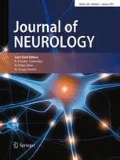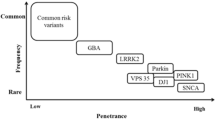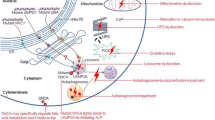Abstract
Over the past few years, several genes for monogenically inherited forms of Parkinson's disease (PD) have been mapped and/or cloned. In a small number of families with autosomal dominant inheritance and typical Lewy-body pathology, mutations have been identified in the gene for α-synuclein. Aggregation of this protein in Lewy-bodies may be a crucial step in the molecular pathogenesis of familial and sporadic PD. On the other hand, mutations in the parkin gene cause autosomal recessive parkinsonism of early onset. In this form of PD, nigral degeneration is not accompanied by Lewy-body formation. Parkin-mutations appear to be a common cause of PD in patients with very early onset. Parkin has been implicated in the cellular protein degradation pathways, as it has been shown that it functions as a ubiquitin ligase. The potential importance of this pathway is also highlighted by the finding of a mutation in the gene for ubiquitin C-terminal hydrolase L1 in another small family with PD. Other loci have been mapped to chromosome 2p and 4p, respectively, in a small number of families with dominantly inherited PD, but those genes have not yet been identified. These findings prove that there are several genetically distinct forms of PD that can be caused by mutations in single genes.
On the other hand, there is at present no direct evidence that any of these genes have a direct role in the aetiology of the common sporadic form of PD. Epidemiological, case control, and twin studies, although supporting a genetic contribution to the development of PD, all suggest a clear familial clustering only in a minority of cases. It is therefore widely believed that a combination of interacting genetic and environmental causes may be responsible in this majority of PD-cases. However, studies of gene-environment interactions have not yet produced any convincing results. Nevertheless, the elucidation of the molecular sequence of events leading to nigral degeneration in clearly inherited cases is likely to shed light also on the molecular pathogenesis of the common sporadic form of this disorder.
Similar content being viewed by others
Author information
Authors and Affiliations
Additional information
Received: 27 March 2001, Accepted: 5 April 2001
Rights and permissions
About this article
Cite this article
Gasser, T. Genetics of Parkinson's disease. J Neurol 248, 833–840 (2001). https://doi.org/10.1007/s004150170066
Issue Date:
DOI: https://doi.org/10.1007/s004150170066




